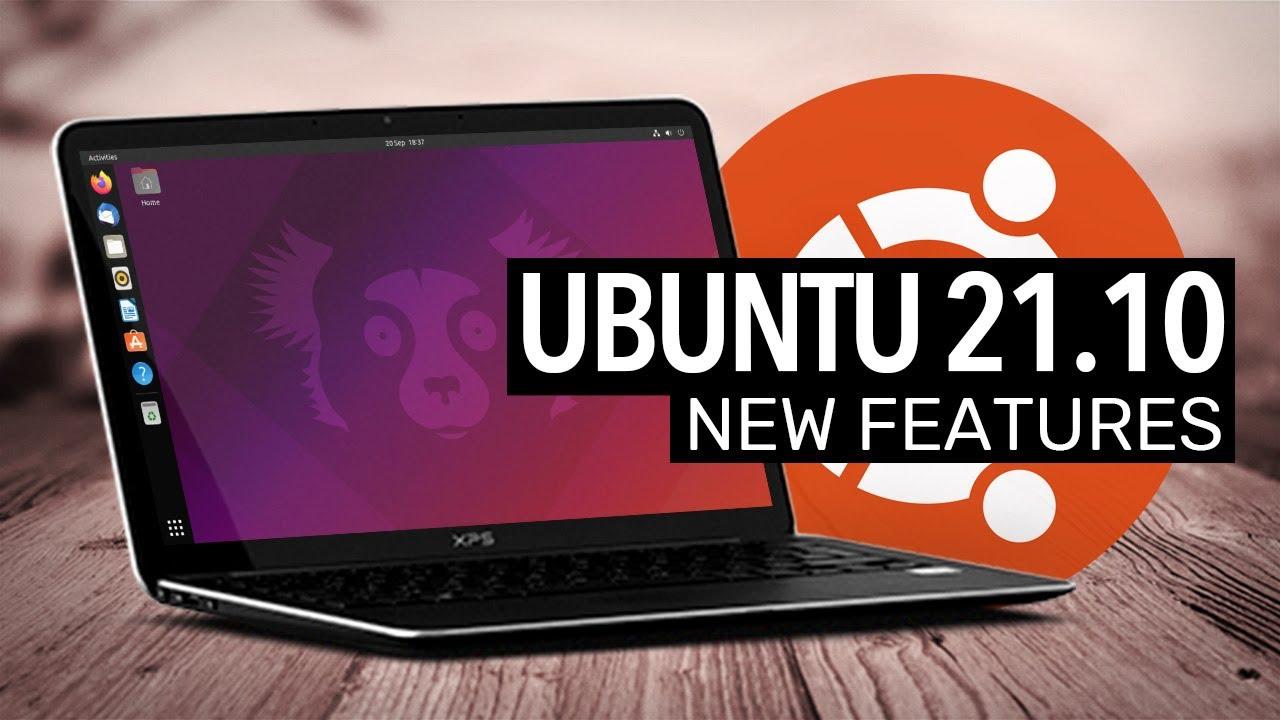After another 6 months of hard work following the Ubuntu 21.04 release, Ubuntu 21.10 is out now with it being supported until July 2022. If you want long-term support (LTS), you're best sticking with Ubuntu 20.04.3 LTS but there will be another LTS release in April 2022.
What's new with Ubuntu 21.10? A few quick items:
- Linux Kernel 5.13 bringing new hardware support
- Firefox 93, with it now a Snap package as a joint effort between Canonical and Mozilla
- Wayland session available for NVIDIA GPU users
- PulseAudio 15 bringing support for Bluetooth LDAC and AptX codecs, as well as HFP Bluetooth profiles providing better audio quality
- GNOME 40
- LibreOffice 7.2.1
- Thunderbird 91.1.2
GNOME 40 is probably the biggest user-facing change, as that release came with the redesigned Activities Overview. More on the differences in GNOME 40 in our previous article. However, Ubuntu continues to add in their dock on the left so it's not a stock GNOME 40 experience making it a bit easier to use. Screenshots below (click them to enlarge):
Where to download? Well, that depends what version you want.
There's the official Ubuntu, Ubuntu MATE, Kubuntu and others - it all depends what desktop environment you want.
Canonical doesn't usually do flashy release videos but our friends at OMGUbuntu put together a nice one going over it:

Direct Link
I am excited to see what Pop!_OS will do in 21.10Exactly my tought! Pop_OS! 21.10 incoming!
I find it kind of amusing that I like Pop_OS due to them ripping out Snap, and it's easier to just switch to just normal Gnome with it, than it is to switch to normal Gnome and to rip out snap for Ubuntu.I am excited to see what Pop!_OS will do in 21.10Exactly my tought! Pop_OS! 21.10 incoming!
And yeah, looking forward to Pop_OS 21.10 now, albeit, I take their improvements with a pinch of salt these days, given that I'm a bit of a KDE convert!
Pulseaudio 15 is now weirdly "meh", now that the world has re-focused on Pipewire instead. I suppose Pipewire still leverages PA under the hood though?
And yeah, looking forward to Pop_OS 21.10 now, albeit, I take their improvements with a pinch of salt these days, given that I'm a bit of a KDE convert!
I believe Pipewire has interfaces for both PulseAudio and Jack.... though I can't remember if that's PA -> PW or if it was for using applications expecting PA/Jack with PW.
Pulseaudio 15 is now weirdly "meh", now that the world has re-focused on Pipewire instead. I suppose Pipewire still leverages PA under the hood though?
And yeah, looking forward to Pop_OS 21.10 now, albeit, I take their improvements with a pinch of salt these days, given that I'm a bit of a KDE convert!
Totally get your point. Still hoping for SteamOS 3.0 to be released. If it's widely available, that's probably when I'll switch to KDE.
I am excited to see what Pop!_OS will do in 21.10Exactly my tought! Pop_OS! 21.10 incoming!
The Pop!_OS 21.10 beta is available now. I think it's been available for several days.
I had a short period using it, but I've been mostly a SteamOS user since 2013, and only resorted to Ubuntu when SteamOS 2.0 was clearly abandoned (or so I thought at the time).
I did tried to keep SteamOS alive by adding Sidux repos and having practically everything up to date, but it eventually it was: what's the point?
Ubuntu served me well and I have no complaints, but for now: So Long, and Thanks for All the Fish, looking forward for SteamOS 3.
Well, for me is hello Ubuntu, goodbye Ubuntu, its days as my distro are numbered.I still think it shouldn't be called SteamOS 3 and needs to be 4... 3.0 was the beta branch based on Debian, and we all know Valve can't count to 3, but assuredly they can count to 4. :P
I had a short period using it, but I've been mostly a SteamOS user since 2013, and only resorted to Ubuntu when SteamOS 2.0 was clearly abandoned (or so I thought at the time).
I did tried to keep SteamOS alive by adding Sidux repos and having practically everything up to date, but it eventually it was: what's the point?
Ubuntu served me well and I have no complaints, but for now: So Long, and Thanks for All the Fish, looking forward for SteamOS 3.
I also wish I could find some time to test it, but I don't know why you couldn't take SteamOS 2.0 and change the repositories to mainstream Debian and just upgrade to Bullseye and have a newer / stable system.
I still think it shouldn't be called SteamOS 3 and needs to be 4... 3.0 was the beta branch based on Debian, and we all know Valve can't count to 3, but assuredly they can count to 4. :PYou mean the SteamOS Clockwerk attempt maybe? In any case, it was never viable, even as a beta, just an incomplete repo.
I also wish I could find some time to test it, but I don't know why you couldn't take SteamOS 2.0 and change the repositories to mainstream Debian and just upgrade to Bullseye and have a newer / stable system.You can add Debian repos, and that's what I did for a while, but eventually Sidux offered some newer Mesa drivers I believe (don't remember exactly what it was the reason).
Correct, SteamOS Clockwerk was supposed to be 3.0. One of the devs were infuriated with the way .deb packages were built. Which to be fair, is a far more complicated process than PKGBUILD files for sure, so I can see with that why they moved to Arch.I still think it shouldn't be called SteamOS 3 and needs to be 4... 3.0 was the beta branch based on Debian, and we all know Valve can't count to 3, but assuredly they can count to 4. :PYou mean the SteamOS Clockwerk attempt maybe? In any case, it was never viable, even as a beta, just an incomplete repo.
I also wish I could find some time to test it, but I don't know why you couldn't take SteamOS 2.0 and change the repositories to mainstream Debian and just upgrade to Bullseye and have a newer / stable system.You can add Debian repos, and that's what I did for a while, but eventually Sidux offered some newer Mesa drivers I believe (don't remember exactly what it was the reason).
But running either Debian stable+backports (currently Bullseye and new enough currently to be quite usable for a gaming OS) or Debian Sid, which now has the 5.14+ kernel would also be fine. So my curiosity is if you could install SteamOS 2.0, and just change the repos to Debian Sid or Bullseye and it'd just update and be current, rather than stagnant.
So my curiosity is if you could install SteamOS 2.0, and just change the repos to Debian Sid or Bullseye and it'd just update and be current, rather than stagnant.I don't remember exactly, but last time it was either testing or unstable I upgraded to, it wasn't exactly a straightforward process, though definitely possible. Then switched to Sidux, again not straightforward. At that point I had to ask myself, is this still SteamOS, why do I even bother, if Valve doesn't give a shit, what am I doing?
It was doable at the time, but I kinda doubt is still possible now, and again what's the point with SteamOS 3 on the horizon, which will be Arch based btw.
Pulseaudio 15 is now weirdly "meh", now that the world has re-focused on Pipewire instead. I suppose Pipewire still leverages PA under the hood though?
And yeah, looking forward to Pop_OS 21.10 now, albeit, I take their improvements with a pinch of salt these days, given that I'm a bit of a KDE convert!
I believe Pipewire has interfaces for both PulseAudio and Jack.... though I can't remember if that's PA -> PW or if it was for using applications expecting PA/Jack with PW.
That is for using applications expecting PA/Jack to work with PW instead. PW replaces PA and Jack, it does not work with them so to speak.
In case you're not comfortable with Arch, but are with Debian, I suppose?So my curiosity is if you could install SteamOS 2.0, and just change the repos to Debian Sid or Bullseye and it'd just update and be current, rather than stagnant.I don't remember exactly, but last time it was either testing or unstable I upgraded to, it wasn't exactly a straightforward process, though definitely possible. Then switched to Sidux, again not straightforward. At that point I had to ask myself, is this still SteamOS, why do I even bother, if Valve doesn't give a shit, what am I doing?
It was doable at the time, but I kinda doubt is still possible now, and again what's the point with SteamOS 3 on the horizon, which will be Arch based btw.
Also, if you already have SteamOS 2.0 installed somewhere, you could just update it to newer kernels / mesa / nvidia without needing to re-install.
Well, for me is hello Ubuntu, goodbye Ubuntu, its days as my distro are numbered.I still think it shouldn't be called SteamOS 3 and needs to be 4... 3.0 was the beta branch based on Debian, and we all know Valve can't count to 3, but assuredly they can count to 4. :P
I had a short period using it, but I've been mostly a SteamOS user since 2013, and only resorted to Ubuntu when SteamOS 2.0 was clearly abandoned (or so I thought at the time).
I did tried to keep SteamOS alive by adding Sidux repos and having practically everything up to date, but it eventually it was: what's the point?
Ubuntu served me well and I have no complaints, but for now: So Long, and Thanks for All the Fish, looking forward for SteamOS 3.
I also wish I could find some time to test it, but I don't know why you couldn't take SteamOS 2.0 and change the repositories to mainstream Debian and just upgrade to Bullseye and have a newer / stable system.
Well install a arch based distro and install steamos session + and you will have a SteamOS system without any hassle, or if you dont need the desktop install chimeraOS.
I actually triple boot on my main system, Arch Linux (had that install since pre-systemd switch), Debian Sid (for the past... 3? releases), and Windows 10. I've legit upgraded the hardware more than I've swapped out / re-installed operating systems. Though I did re-install Windows 10 to try to fix some issue, and damned if it actually fixed anything, it's still garbage :P Oh, it was because it wouldn't update to the latest version and that did get fixed by an install of the newer version :PWell, for me is hello Ubuntu, goodbye Ubuntu, its days as my distro are numbered.I still think it shouldn't be called SteamOS 3 and needs to be 4... 3.0 was the beta branch based on Debian, and we all know Valve can't count to 3, but assuredly they can count to 4. :P
I had a short period using it, but I've been mostly a SteamOS user since 2013, and only resorted to Ubuntu when SteamOS 2.0 was clearly abandoned (or so I thought at the time).
I did tried to keep SteamOS alive by adding Sidux repos and having practically everything up to date, but it eventually it was: what's the point?
Ubuntu served me well and I have no complaints, but for now: So Long, and Thanks for All the Fish, looking forward for SteamOS 3.
I also wish I could find some time to test it, but I don't know why you couldn't take SteamOS 2.0 and change the repositories to mainstream Debian and just upgrade to Bullseye and have a newer / stable system.
Well install a arch based distro and install steamos session + and you will have a SteamOS system without any hassle, or if you dont need the desktop install chimeraOS.
But installing Arch or ChimeraOS is not what I'm talking about here. My purpose was to prove out that Debian would have been fine to have stuck with, instead of them changing their base.
Pulseaudio 15 is now weirdly "meh", now that the world has re-focused on Pipewire instead. I suppose Pipewire still leverages PA under the hood though?
Pulse has been feature complete and stable for most users for a couple of years now. It makes zero sense to write all new audio core and introduce a bunch of new bugs just because a small group of loud mouths can't stand the PulseAudio dev. For 99% of Linux users PipeWire will show zero improvements over or Pulse.
Pulseaudio 15 is now weirdly "meh", now that the world has re-focused on Pipewire instead. I suppose Pipewire still leverages PA under the hood though?
Pulse has been feature complete and stable for most users for a couple of years now. It makes zero sense to write all new audio core and introduce a bunch of new bugs just because a small group of loud mouths can't stand the PulseAudio dev. For 99% of Linux users PipeWire will show zero improvements over or Pulse.
Spoken like someone who hasn't used bluetooth headsets, had to use a PC with multiple inputs and outputs (PA still doesn't have a way to choose a default), or had to constantly restart PA because of crackling in VR.
PA is a bit of a car crash. It was a useful step up from Alsa for multiple-stream support... for about a year, then ALSA got that baked in, but most distros had committed to PA by then. I can't think of a single upgrade to PA that's made using it any more pleasant. It's stale, and I'm extremely glad Pipewire is shaking things up again.
PA is a bit of a car crash. It was a useful step up from Alsa for multiple-stream support... for about a year, then ALSA got that baked in, but most distros had committed to PA by then. I can't think of a single upgrade to PA that's made using it any more pleasant. It's stale, and I'm extremely glad Pipewire is shaking things up again.
For me the multiple inputs and outputs kind of works. It might just take little fiddling around for the first time. Disabling unused outputs also helps, otherwise Pulseaudio might prefer to pick the wrong one. At least with Pavucontrol fixing the inputs the outputs is quick once you learn what are the most common problems. Definitely could be better though.
There's no going back to ALSA though as many games will insist on using Pulseaudio. So having Pulseaudio compatibility is must. I was quite happy with ALSA, but the support has been dwindling, so I have been on Pulseaudio for a while now.
Actually funnily Pipewire Wikipedia article lists several Pulseaudio annoyances that it fixes: https://en.wikipedia.org/wiki/PipeWire#Reception
Last edited by Anza on 31 Oct 2021 at 8:55 am UTC














 How to set, change and reset your SteamOS / Steam Deck desktop sudo password
How to set, change and reset your SteamOS / Steam Deck desktop sudo password
See more from me